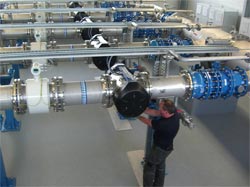Environmentally compatible disinfection of drinking water

The Siemens Barrier M 3800 UV disinfection plant in Echthausen Water Works, Germany<br>
Five Siemens ultraviolet (UV) disinfection plants came into operation in May in the Echthausen Water Works belonging to Wasserwerke Westfalen GmbH, Germany.
They have considerably reduced the amount of chemicals used by the drinking water supplier. This process also eliminates microorganisms which cannot always be adequately controlled by other disinfection processes. These new UV plants are part of Wasserwerke Westfalen's extensive investment project to further improve the quality of its drinking water.
Echthausen Water Works supplies 20 communities with some 20 million cubic meters of drinking water. Wasserwerke Westfalen GmbH is a subsidiary company of both Dortmunder Energie- und Wasserversorgung GmbH and Gelsenwasser AG, and is the largest producer of drinking water in the German state of North Rhine-Westphalia. Ingo Becker, managing director of Wasserwerke Westfalen GmbH, said that all water works would need to install additional treatment stages in the next few years in order to meet future drinking water quality requirements, and that most of these stages would involve physical processes. This would involve an investment of approximately 20 million Euros at each location.
Five Barrier M 3800 type UV plants have been installed in Echthausen. They have replaced the previous chlorine dioxide stage, and complete the water treatment. Rob van Esch, the Siemens project manager, explained, “UV plants are often more effective than other disinfection processes, particularly against spore forming microorganisms which can encapsulate.” In addition to that, the taste of the drinking water remains unchanged, and the operational handling of chemicals is eliminated.
The UV plants are operated in parallel, and have an average of 2,200 and a maximum throughput of 4,000 cubic meters of water per hour. Each plant can be separately controlled to match requirements. The continuously variable control of the intensity of irradiation delivers exactly the required “dose”. Electronic control gear ensures high efficiency: combining the safest possible disinfection with energy-saving operation.
The Simatic PCS7 process control system is used to control the plants. This enables the UV disinfection stage to be seamlessly integrated into Wasserwerke Westfalen's overall control concept, which is also based on PCS7. The peripheral equipment is connected by ET200 signal modules and communications via Profibus are also integrated. The UV plants can be operated either with the WinCC HMI system from the local Echthausen works control center or from the control center in Hengsen.
The main reasons for winning the order were the integrated control concept, and Siemens's ability to offer both the design engineering and the construction of the plant.
The Siemens Industry Sector (Erlangen, Germany) is the worldwide leading supplier of environmentally friendly production, transportation, building and lighting technologies. With integrated automation technologies and comprehensive industry-specific solutions, Siemens increases the productivity, efficiency and flexibility of its customers in the fields of industry and infrastructure. The Sector consists of six divisions: Building Technologies, Drive Technologies, Industry Automation, Industry Solutions, Mobility und Osram. With around 207,000 employees worldwide (September 30), Siemens Industry achieved in fiscal year 2009 total sales of approximately €35 billion.
The Siemens Industry Solutions Division (Erlangen, Germany) is one of the world's leading solution and service providers for industrial and infrastructure facilities comprising the business activities of Siemens VAI Metals Technologies, Water Technologies and Industrial Technologies. Activities include engineering and installation, operation and service for the entire life cycle. A wide-ranging portfolio of environmental solutions helps industrial companies to use energy, water and equipment efficiently, reduce emissions and comply with environmental guidelines. With around 31,000 employees worldwide (September 30), Siemens Industry Solutions posted sales of €6.8 billion in fiscal year 2009.
Media Contact
All latest news from the category: Process Engineering
This special field revolves around processes for modifying material properties (milling, cooling), composition (filtration, distillation) and type (oxidation, hydration).
Valuable information is available on a broad range of technologies including material separation, laser processes, measuring techniques and robot engineering in addition to testing methods and coating and materials analysis processes.
Newest articles

Combatting disruptive ‘noise’ in quantum communication
In a significant milestone for quantum communication technology, an experiment has demonstrated how networks can be leveraged to combat disruptive ‘noise’ in quantum communications. The international effort led by researchers…

Stretchable quantum dot display
Intrinsically stretchable quantum dot-based light-emitting diodes achieved record-breaking performance. A team of South Korean scientists led by Professor KIM Dae-Hyeong of the Center for Nanoparticle Research within the Institute for…

Internet can achieve quantum speed with light saved as sound
Researchers at the University of Copenhagen’s Niels Bohr Institute have developed a new way to create quantum memory: A small drum can store data sent with light in its sonic…





















